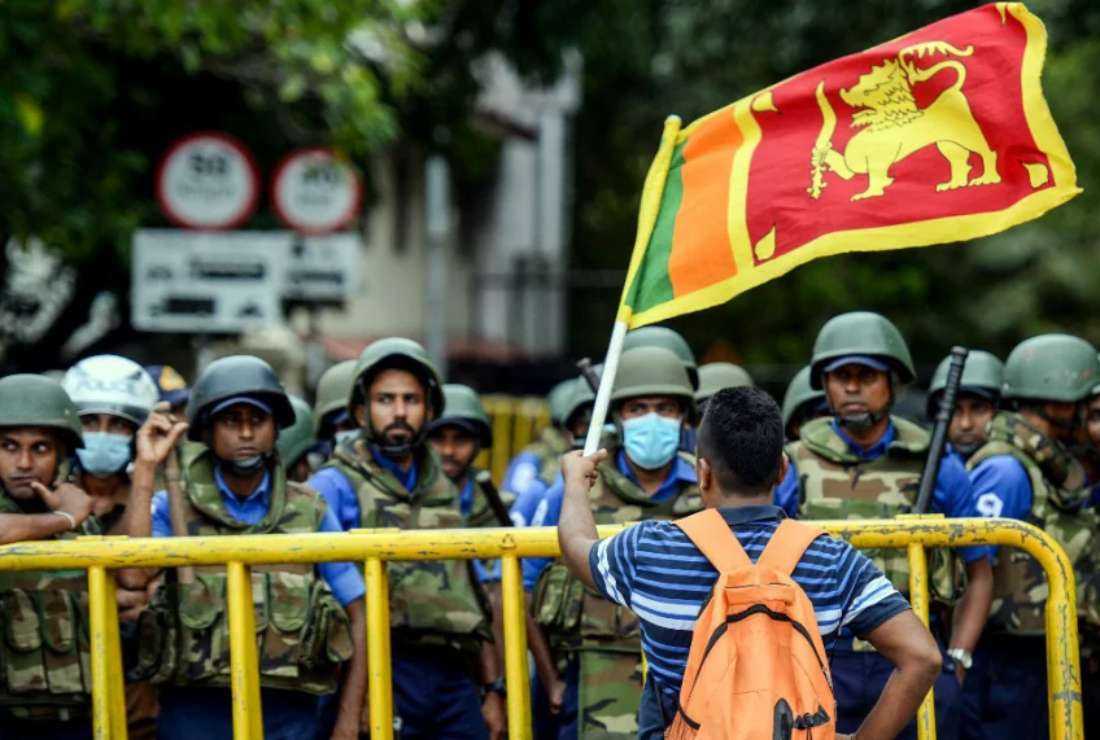
A demonstrator waves a Sri Lankan flag near police barricades during a protest march headed to the Presidential secretariat office against Sri Lankan President Ranil Wickremesinghe, in Colombo on July 22, 2022. (Photo: AFP)
Hundreds of Sri Lankans including religious marched on the streets of national capital Colombo to oppose the increase in electricity tariffs for the third time in a year, amid a crippling economic crisis in the island nation.
Protests have also erupted in several cities where demonstrators carried torches and chanted slogans condemning the administration of President Ranil Wickremesinghe.
Religious leaders have publicly criticized the government saying the move to increase electricity prices was “extremely unfair” as the people could not afford more electricity bills as they struggle to survive amid the worst economic crisis in the nation’s history.
Buddhist monks who joined the protest marches have opposed the government's move.
Venerable Omalpe Sobitha Thera, an internationally acclaimed scholar, researcher and philanthropist said that it is unfair to increase the electricity tariff by another 18 percent when there are so many crises and challenges for families in the country.
"Although a Public Commission has been established, public opinion is not represented there. How do farmers and plantation workers from remote villages come to the Commission which has been established in Colombo?" said Sobitha Thera on Oct. 24 in Colombo.
"How can farmers come to Colombo from distant villages to tell their problems to the Commission?" the monk questioned.
Sri Lanka has 6.8 million electricity consumers. A consumer who uses 180 units of electricity will have to pay approximately 10,500 rupees (US$35) now.
Red notices have been issued to thousands of consumers who have not paid their bills. The time given to a customer to pay the electricity bill is 40 days.
The electricity tariffs were revised twice this year and in 2022.
Earlier, religious leaders accused the government of cutting off electricity supply in religious places due to non-payment of increased electricity bills amid the economic crisis.
The leaders alleged that the electricity bills of religious places have been increased by 500 percent.
Sobitha Thera said the temples do not have sufficient income to pay the high electricity bills due to a drop in donations due to the economic crisis.
The electricity supply of Sri Dharmasingharamaya and Uthuankanda Sri Dharmadutha Yogashram in Hambantota had been disconnected, media reports say.
Venerable Professor Agalakada Sirisumana Thera, senior lecturer at the University of Colombo said that it is extremely unfair to ask people to pay more electricity bills when family expenses have already increased four to five times.
"We ask the rulers of the country why they do not understand the suffering and challenges of the countrymen," said Ven. Sirisumana Thera.
Father Jude Wilson of the Order of Saint Benedict (OSB), parish priest of St. Ann Church in the diocese of Ratnapura, said churches do not have enough income to pay high electricity bills.
Father Wilson said his church’s electricity bill has gone up to 8,000 rupees.
“There are only 380 Catholic families in the whole parish and only some families attend the Sunday Holy Mass and offer their contribution," he told UCA News.
"A lot of electricity is used during the church feast, Christmas period and Lent season. The increase in the electricity bill is very difficult for religious places like our diocese to bear, especially in the areas where there are less faithful," he added.
Ratnapura diocese has 22 parishes with 19,286 Catholics and 27 priests.
Father Wilson said that the bills of these churches are paid by the devotees.
"When the electricity tariff increases, it will cause difficulty in the regular religious services like evening Holy Mass, Sunday Schools, Parish Councils and other meetings," said the priest.
Venerable Battaramulla Seelarathana Thera asked how vulnerable people can pay the increased electricity bill.
"How can children study if there is no electricity at houses?" said Seelarathana Thera.
Venerable Professor Pallekande Rathanasara Thera, secretary of Sri Lanka Amarapura Maha Sangha Sabha, a major Buddhist group, said a lack of educated members in the current parliament means they do not understand the reality of the people.
"These politicians have not fulfilled their duties for the country," he said.
Government officials have defended the electricity tariff hike by citing a bailout agreement with the International Monetary Fund (IMF) that requires cutting off subsidies to utilities such as power.
Energy Minister Kanchana Wijesesekera said that the 18 percent electricity tariff hike was small compared to the higher tariff initially proposed by the regulator.


